#this is the worlds most Jewish song
Text
It should be illegal for Christians to cover Leonard Cohen songs
#when they change the like well maybe there’s a god above to I know there’s a god above#makes me see red become so angry and violent fuccckkkk#this is the worlds most Jewish song#it’s not about fucking Jesus#it’s an exploration of the tenuous nature of faith in Judaism#it’s full of allusions to stories from the tanach#and sometimes goyim do nice covers like Jeff Buckley or Rufus wainwright but mostly it’s blatant disrespect#christian hegemony#jumblr#Judaism#jewish culture#leonard cohen#jewish tag
4K notes
·
View notes
Text
On May Day, May 1, 1943, surviving fighters in the Warsaw Ghetto, most of whom were varying stripes of Socialist, sang The International. One of Jewish commanders, Marek Edelman, wrote about it in his memoir:
“On May Day, the Command decided to carry out a ‘holiday’ action. Several battle groups were sent out to ‘hunt down’ the greatest number of Germans possible. In the evening, a May Day roll-call was held. The partisans were briefly addressed by a few people and the ‘Internationale’ was sung. The entire world, we knew, was celebrating May Day on that day and everywhere forceful, meaningful words were being spoken. But never yet had the ‘Internationale’ been sung in conditions so different, so tragic, in a place where an entire nation had been and was still perishing. The words and the song echoed from the charred ruins and were, at that particular time, an indication that Socialist youth was still fighting in the Ghetto, and that even in the face of death they were not abandoning their ideals.”
He didn't include anything regarding the language they sang in, but Edelman was a member of the Bund, and they were staunch Yiddishists, so I'd like to think it sounded like this:
youtube
299 notes
·
View notes
Text
As a Jew, I have felt completely alienated by the community that purports to represent me. In my earliest childhood memories, I recall family members, Hebrew School teachers, and religious leaders telling me about the many promises of the state of Israel: a safe home for all Jews, a place – I was told – where we made the desert bloom. From as early as I can remember, I was taught by my family members and Hebrew School teachers that Jews need Israel because of the devastating losses during the Holocaust and enduring antisemitism. I went to Hebrew School three days a week, and remember feeling almost-constantly panicked about the potential for another Holocaust. The message was painfully clear: everyone hates Jews, and that’s why we need Israel. There was so much about Jewish history and culture I never learned in Hebrew School: our working-class roots and deep commitment to the labor and socialist movements both in Eastern Europe and in the U.S.; Sephardic and Mizrahi culture and customs; the history of Yiddish; even the Warsaw Ghetto Uprising.
And of course, left out of most American Jewish education are the violent origins of the Jewish state: Israel’s dispossession and mass slaughter of Palestinians in 1948. The land on which Israel was built was not a barren desert made fertile by Jewish refugees and immigrants, but the Palestinians’ homeland, inhabited for millennia. When I began to learn the truth – that Israel violently expelled almost 1 million Palestinians to create the state of Israel – I felt completely shocked, and deeply betrayed by the adults whom I had trusted. It seemed – and I now know with certainty that it is – antithetical to Jewish values.
Since I first learned about the Nakba, I’ve regularly felt alone in my religious community. There’s an assumption – from both the Jewish community and society at-large – that because we are Jews, we are also Zionists. Yet, so much of my political compass – including my commitment to anti-Zionism, actually comes from what I’ve learned from being a Jew. The same Hebrew school teachers who instructed me to love Israel also taught me Jewish songs like Olam Chesed Yibaneh (we will build this world with love) and Lo Yisa Goy (nation shall not lift up sword against nation). Israel’s occupation of Palestine and its subjugation of Palestians contradicts these Jewish tenets, yet in a majority of American Jewish communities, those of us who oppose Israeli colonialism are treated as traitors. It’s been confusing to feel both deeply connected to Judaism and Jewish values, and to also be told repeatedly by Jews and Zionists that I’m a self-hating Jew. It often makes me feel like I have no safe religious home. The only times I’ve felt like I’m free to practice my religion as an anti-Zionist, and to proudly declare that I’m an anti-Zionist because I’m Jewish, are when I’ve taken action with Jewish Voice for Peace, an anti-Zionist, Jewish organization that stands in solidarity with Palestinians.
312 notes
·
View notes
Text
by Daniel Ben-Ami
A man goes into a store to buy a can of Pepsi. The proceeds of the sale go through a chain of cash-thumbing, financial intermediaries. Eventually the money is handed over to someone to pay for the manufacture of a missile. The missile is fitted on to a combat aircraft, which closes in on its target. Eventually the missile locks on to a (presumably) Palestinian child. As it explodes, the word ‘boycott’ flashes up on screen.


This video, distributed on X by Palestine Online, is just one of countless anti-Israel clips on social media. But it bears closer examination as it helps to illustrate the nature of contemporary anti-Semitism. Here, as in many other cases today, Jews are not overtly identified. There is not even an explicit mention of Israel. Instead, the video assumes the target viewer will recognise the not-so-subtle anti-Semitic pointers, such as references to financial speculation and the age-old ‘blood libel’ of child murder. Not identifying Jews directly also gives some degree of deniability to anyone who wants to claim they are not anti-Semitic.
That’s not to downplay the existence of overt anti-Semitism. This has increased dramatically since 7 October. In the past few days alone, an Orthodox Jewish man has been stabbed in Zurich while another was beaten outside a Paris synagogue. But a great deal of Jew hatred still tends to take a disguised form.
Its most common manifestation, as the ‘boycott’ Pepsi video indicates, is an animus towards Israel. An animus that long predates its current war with Hamas. In the warped view of anti-Israel activists, Israel is the epitome of evil. It is said to be manipulating finance for its own ends and slaughtering children. Supposedly, it is a ‘genocidal’, ‘apartheid’ state – morally charged terms that tend not to be applied to other nations.
Seeing Israel as evil incarnate, today’s anti-Israel activists target its every manifestation. They try to cancel Israeli dance companies in New York. They demand Israel’s expulsion from the Eurovision song contest. And they attempt to banish it from the Olympics and the football World Cup. In short, they seek to erase Israel from the world. That is the true meaning of today’s boycott campaigns. To purge the world of any Israeli presence. To eradicate any signs of Israeli culture.
101 notes
·
View notes
Text
A cool Dvar Torah I read:
Parshat HaChodesh, the New Moon, and Eclipses!
This Shabbat we read a special section from the Torah called Parshat Hachodesh. It is the story of the Mitzvah of Rosh Chodesh, that we track, observe and celebrate the new moon each and every month.
Since the day that G-d commanded Moshe regarding this Mitzvah, two weeks before the grand Exodus from Egyptian slavery, we have kept a close eye on the moon, looking out for that celestial monthly moment of rebirth that G-d showed Moshe that early evening in Egypt.
In the Torah, our holidays - Passover, Sukkot, Yom Kippur etc. - are prescribed to happen on a certain day following the new moon: "the fifteenth day after the new moon", "the tenth day after the new moon" and so on. Meaning, that if we wish to celebrate these festivals, we need to keep track of the lunar cycle, even if no one else on Earth gives it a second thought.
Along the way, the Jewish people have come to identify with the moon.
We can empathize with the moon's ups and downs, so similar to our own history. One moment we're shining bright, the next moment we're so oppressed and persecuted that casual observers have often written us off, predicting our extinction, G-d forbid. And yet the next moment, to their disbelief, we're back, reborn out of the darkness, and growing stronger every day.
It's notable that G-d interrupted the flow of events leading up to the Exodus to tell Moshe about Rosh Chodesh. Not only because it seems to be unrelated to what was happening then, but also because by giving that Mitzvah right then, it meant that it would given in Egypt, the darkest spiritual locale in the world. G-d could have waited a couple of weeks until we were out of that spiritual wasteland and told us about Rosh Chodesh in the desert. Why the rush?
*
Everyone's talking about the eclipse happening Monday afternoon - The Great North American Eclipse. It's a major event that will have millions of people looking up to the Heavens, an event that will not happen again in the USA until 2044.
Now, solar eclipses only happen around the new moon. Monday night and Tuesday, Jews will observe Rosh Chodesh. And not just any Rosh Chodesh, but the annual Rosh Chodesh of all Rosh Chodeshes - the first Rosh Chodesh of the year. This means that Monday is the day before rebirth, the day when the moon is at its very lowest, darkest point, the moment that symbolizes the most difficult, challenging times of the Jewish People.
And so it turns out that precisely in its smallest, weakest moment, the moon looms largest: it can even eclipse the mighty light of the sun.
Is this not our story exactly? Is this not precisely why G-d told this to Moshe in Egypt, in our place of misery and suffering? During the last new moon of our centuries-long sojourn in Egypt, G-d shows Moshe the truth about the miracle of Jewish rebirth and eternity. In the place of our pain, before the redemption, in the midst of the uncertainty, G-d stops everything and tells us to look up at the moon, see our story in the moon's story, and discover in the moon a solid friend, an eternal gentle reminder that it will be okay, that no matter what, Am Yisrael Chai forever.
And better yet, as Monday's eclipse shows, our darkest moments are when we shine brightest and loom largest, as we begin the great turnaround, the journey from darkness to light.
This Monday will be the 3,336th anniversary of the day G-d showed Moshe the moon.
How perfect. During these painful days of antisemitism, the sun, 400 times bigger than the moon, is eclipsed by it. Far from tottering or faltering, the Jewish People are stronger than ever. Precisely when casual observers report us missing, that's when we shine.
L'Chaim, brothers and sisters. Our best days lay just ahead. So in the words of the Lecha Dodi which we'll all be singing in just a few hours:
"Wake up, wake up! Your light is coming, rise and shine! Time to wake up and say your song, because G-d's glory is revealed upon you."
by Rabbi Eli Friedman, Chabad Calabasas CA
#jumblr#eclipse#solar eclipse#north american solar eclipse 2024#judaism#if jew know jew know#rosh chodesh#rosh chodesh nissan#dvar torah
91 notes
·
View notes
Text
Officially, in the western church, today isn't the Annunciation. This is Holy Monday, and the Annunciation is moved to avoid coinciding with Holy Week. I think if it were during the Triduum I would appreciate this, making space to hold both days separately. But it's Monday, and they can't stop me from thinking about Mary during Holy Week. March 25 is a traditional date of both Jesus's death and conception, as well as the Creation—a spring equinox of redemption. Holding space for all these things has always been appropriate. Birth and death coexist; Jesus's beginnings were the beginnings of his mortality. The angel announces the future, and whoever listens must live through all of it.
What did it mean for Mary to say yes to this? We laugh at the "Mary did you know?" lyrics, because we know she knew. But she also didn't have to know the details of God's plan to say yes to what every parent says yes to—witnessing. Acknowledging the bringing into the world of a frail being, perhaps giving your body to make this happen, praying that you will die before they do but knowing that is not promised. And every parent living under a violent state knows what it is to hope it's not your kid that's next (whether you're a Black parent teaching your child how to talk to cops, or a Palestinian parent hiding in rubble, or a Jewish parent under Roman occupation who's seen the crosses outside the city walls).
Do you think, at the foot of the cross, Mary thought of her response, "Let it be unto me according to your word"? After bearing that Word inside her, teaching him how to walk, waiting for God to change his mind, to reveal a ram caught in a thicket so her son wouldn't have to die after all, do you think she remembered her teenage self, magnifying the Lord? "The Almighty has done great things for me"—and to me. Great as in too big to look at all at once, bloodstained things. The power of the Most High is overshadowing her—the shadow of the cross—his flesh broken, and someone (including her perhaps) will take him down and wash him for burial.
What does it mean to hold space for that day when an angel tore into her life, breaking it open for God—during Holy Week? If we desire a feast, we should wait until Easter, I agree. But today I honor a lady of sorrows—I desire an acknowledgement of the violence of agreeing to live and love and create when it will be torn away. The story never ends there, but we must live through this week (and whatever weeks of our lives hold these things) saying yes, witnessing. Judas quit before the miracle happened—he couldn't witness death so he didn't witness the life (on this earth). Mary kept saying yes, even at the end.
We can never know everything we are saying yes to when we surrender to God. She knew in one sense, yes, but no one knows what it's like to lose a son until it happens. And no one but her knows what it's like to be the Mother of God. We already know what God wants us to do, but we don't know until it happens how much it hurts—and what the dawn will bring. What swords will pierce us, what promises will be kept.
When we say the Magnificat, we usually add a Gloria at the end—Mary did not have those words (the Trinity would not be formulated for another couple hundred years), but we have them. When we sing her song, we hold space for the ways we see God exist, and she saw those ways intimately. She held the Son and was surrounded by the Spirit, and now the Father holds her. As we live through Holy Week every year, every year she says yes. God's love continues unfolding. As it was in the beginning, is now, and will be forever. Amen.
Your assigned reading for today (should you choose to accept it) is @tomatobird-blog 's comic "Thirty Years." A blessed Holy Monday (and Annunciation) to you all.
#i'm not catholic. sorry for leaving out what i'm sure all of u catholics would add#also to clarify i am not making a statement about 'when life begins' re: conception#life is always beginning and ending. jesus's conception is a feast because of the annunciation#not as a scientific or theological statement about fetuses#christianity makes space for fluid boundaries around life and death and I entrust that knowledge to god#my posts
87 notes
·
View notes
Text
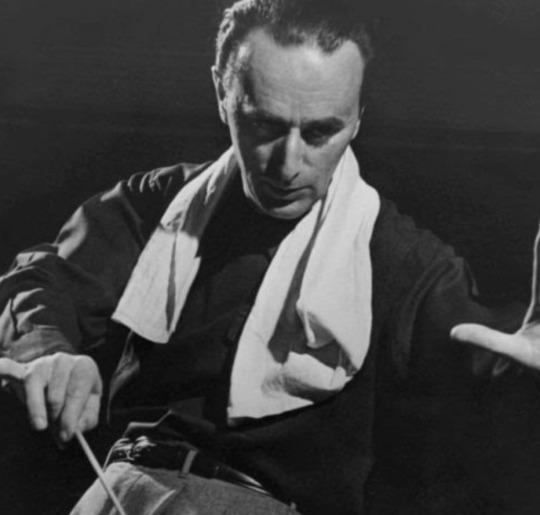
THURSDAY HERO: Herbert Zipper
Herbert Zipper was a conductor and composer who founded a secret orchestra at Dachau, and wrote a song that became an anthem for death camp inmates.
Born in 1904 to an affluent Jewish family in Vienna, Herbert was a musical prodigy who studied at the prestigious Vienna Music Academy with the great composer Richard Strauss. He found employment as a conductor and composer for cabaret shows.
Germany annexed Austria in 1938 and immediately started persecuting Jewish citizens. Herbert was arrested that year and sent by the SS to Dachau, where he became a “horse,” pushing a wheelbarrow loaded with heavy rocks for 12 hours a day. One of the most talented composers in Europe was doing the work of an animal.
Herbert was not the only music man in Dachau. All the Jewish members of the Munich Philharmonic – comprising most of the orchestra – were also incarcerated there. Herbert enlisted the other musicians in an audacious, even insane, plan. They would make instruments and create an orchestra, right there at Dachau.
How could anybody create musical instruments in a concentration camp? They combed the camp for discarded pieces of wood and metal and fashioned eleven primitive yet functional instruments. At least one guard helped the musicians; Herbert requested a piece of wire for a string instrument, and later found it under his pillow.
Herbert’s Dachau orchestra performed concerts for the other inmates every Sunday, in an outhouse. It’s hard to imagine the experience of listening to sublime music in a filthy environment, while knowing they could be all killed for their participation. Herbert said that the concerts were not for entertainment, but rather to bring purpose and even a bit of normalcy back to their lives.
Noted playwright Jura Soyfer, an old friend of Herbert’s from his cabaret days, was also at Dachau. Together they wrote “Dachaulied” (Dachau song), with Herbert composing the haunting music in his head and Jura penning the sad, sardonic lyrics inspired by the concentration camp motto “Work will make you free.” They thought that writing the song would help them maintain some dignity in an atmosphere of constant humiliation and demonization. Herbert deliberately made the song difficult to learn, so that his fellow inmates would have to use all of their concentration and thereby mentally escape from their horrific surroundings. Amazingly, the Nazis never discovered the secret orchestra.
At the end of 1938, Herbert and Jura were transferred to Buchenwald where they taught other inmates the Dachau song. Soon after, Jura died of typhus at age 26, and Herbert lovingly prepared his body for burial. At this time Hitler hadn’t yet began to implement his “Final Solution” to kill all the Jews, which started in 1941. Herbert’s father Emil was in London, desperately trying to get a visa for Herbert and his two brothers to escape Austria. Miraculously, Emil was able to secure his sons’ release from Buchenwald, and they joined him in Paris on March 16, 1939.
During all this time, Herbert’s fiancee, dancer Trudl Dubsky, was working in Manila, in the Philippines. She recommended him for the job of conductor of the Manila Symphony Orchestra, and he was hired, traveling there in September, 1939. Herbert and Trudl were married on October 1. Although it wasn’t a world-class orchestra at the time, Herbert enjoyed working with the Manila Orchestra and under his leadership it improved dramatically. Life was good for Herbert and Trudl until January 1942, when the Japanese army invaded the Philippines and occupied Manila. It was a brutal occupation and once again Herbert was arrested, this time for refusing to conduct the orchestra for Japanese military officers. He was incarcerated and harshly interrogated for four months before being released. For the next three years Herbert and Trudl survived hand-to-mouth, owning no belongings and traveling frequently in search of safe haven in a country at war.
The most difficult period was the Battle of Manila in early 1945. More than once the building where they took shelter was bombed by the Japanese artillery and they escaped with only seconds to spare. In the end of February they were living with hundreds of other displaced people in a seven-story building in Manila that had neither electricity or water. Herbert volunteered to get water every day, a dangerous and difficult undertaking. On the early morning of February 26, 1945, Herbert was on his water run when he saw an opportunity to reach the American front line, and he rushed across a battle field to do it. While there he received a crucial piece of information: the apartment building where he was staying was due to be bombed by the Allies within fifteen minutes! Herbert desperately explained that 800-1000 civilians were inside the building! Due to his pleas, the bombardment was delayed for 45 minutes, giving him just enough time to get back to the building and rescue everyone inside including Trudl.
Until Japan was defeated on September 2, 1945, Herbert worked secretly for the American army under the command of General Douglas MacArthur, transmitting valuable information about Japanese shipping schedules by shortwave radio. When Japan finally surrendered, Herbert organized and conducted a concert of Beethoven’s “Eroica” symphony, a goal he’d set during the darkest hours at Dachau. The concert was performed in a bombed-out church.
Herbert and Trudl immigrated to America in 1946, joining the rest of his family. He co-founded and conducted the Brooklyn Symphony Orchestra, and organized another orchestra especially to give free concerts for public school children. Students called Herbert, who had no children of his own, “Papa Z.” For the rest of his life he volunteered and supported arts education for young people.
Herbert was close friends with poet Langston Hughes and they collaborated on an opera together, “Barrier.” Trudl worked as a ballet tacher. They moved to Chicago in 1953, where Herbert founded the Music Center of the North Shore, and then to Los Angeles, where Herbert directed the School of Performing Arts at USC.
Interviewed by a Los Angeles Times reporter at the end of his life, Herbert said “We have to see the world as it is, but we have to think about what the world could be. That’s what the arts are about.”
Herbert is the subject of a biography, “Dachau Song: The Twentieth Century Odyssey of Herbert Zipper,” and a documentary that was nominated for an Academy Award. His beloved wife Trudl died of lung cancer in 1976. He continued his music for two more decades, conducting his last concert in 1996. Herbert Zipper died in Santa Monica in 1997.
For inspiring concentration camp inmates and inner-city schoolchildren with his music, and for saving hundreds of lives during the Japanese occupation of the Philippines, we honor Herbert Zipper as this week’s Thursday Hero.
Lyrics of Dachau Song:
Barbed wire fraught with death surrounds our world
On which a merciless heaven visits frost and sunburn.
Far from us are all joys, far our home, far the women
When mute we march to work, thousands in the gray dawn.
But we learned the Dachau motto and it made us hard as steel.
Be a man, comrade, remain human comrade
Do good work, pitch in, comrade
Because work, work will make you free!
102 notes
·
View notes
Text
Daily update post:
Three more bodies were retrieved from Gaza by the IDF and identified. At least two of them were Israelis taken hostage on Oct 7, who were seen alive in vids published by Hamas as they were being led away, and today it was confirmed that they were murdered in captivity by these terrorists. They were both 19 years old. On the right is Ron Sherman. On the left is his friend, Nick Bizer. In the middle are the last text messages Ron sent to his mom. They read, "Bye mom, I love you all" (followed by five heart emojies), then "That's it," "They're here" and "It's over."

The third body was identified as 28 years old Elia Toledano. He was kidnapped by Hamas terrorists from the Nova music festival on Oct 7. As far as I can tell, there's no confirmation yet of when he was killed.
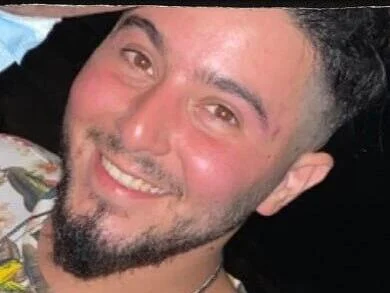
May their memories be a blessing.
The IDF revealed today how Hamas is trying to lure Israeli soldiers into an ambush in a booby trapped area, with armed terrorists lying in wait: by using child-shaped mannequins, school bags and speakers playing recordings in Hebrew and of sobbing, to make the soldiers think hostages might be held there.

Yesterday, the IDF finished a 60 hours operation in Jenin, where the Palestinian Authority is supposed to be responsible to fight against Hamas and terrorism, but in reality, the PA does nothing. This was the longest IDF operation in Jenin since Opoeration Defensive Shield (Mar to May 2002, which started following a wave of suicide bombings, and specifically after the murderous terrorist attack on Park Hotel in Netanya, where Jews eating a Passover meal together were targeted and murdered). During the operation that ended yesterday, the IDF uncovered 10 shafts leading to terror tunnels. That's not in Gaza. Let that sink in.
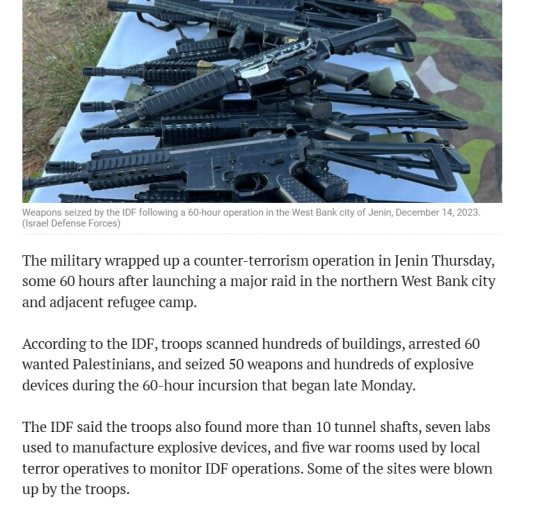
Also, if you see anyone saying, "But Hamas only operates in Gaza!" you'll know they're either ignorant or lying. Hamas only rules Gaza, but it absolutely operates outside it.

Another case in point for that last statement, that Hamas operates outside of Gaza, too. Remember that I posted in my daily update yesterday about the people arrested for having intended to carry out a terrorist attack against Jews in Denamrk? We have more info about that now, and it turns out that 7 people were arrested in total, not just 4, and that they were arrested in 3 countries, not just 2 (so in addition to arrests in Denmark and the Netherlands, terrorists were arrested in Germany as well), and most importantly, the people arrested included Hamas terrorists.

Again, let that sink in. When we tell you that Hamas wants to kill all Jews in the world, that's not just idle talk. It's not just a recent statement, either. Here's a Hamas senior stating as much back in 2019, and they also said as much in their founding charter.
youtube
Maybe just as importantly, these terrorists were taken down thanks to the Mossad's work.
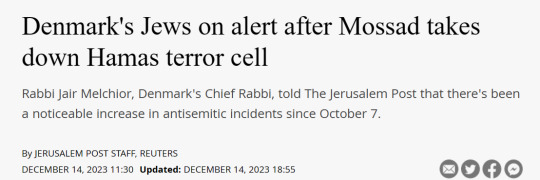
So when we tell you that Jews are safer with Israel existing, that's not just in the case of Jews finding sanctuary from danger in Israel. That's true as well. But there can be Jews, even anti-Zionist Jews, who will lead their entire lives outside of Israel, never realizing that behind the scenes, an antisemitic terrorist attack that could have killed them, was stopped thanks to the fact that the Mossad (Israel's equivalent of the CIA) is in charge not only of protecting Israelis worldwide from terrorist attacks, it's responsible for the safety of all Jews. That's the kind of protection people would rob Jews of, when they advocate for the destruction of Israel, or even "just" the destruction of Israel as a Jewish state.
I thought this was a great response. From Letters to the Editor, Los Angeles Times:

Hanukkiahs lit in honor of the Israeli hostages, in the Jewish Quarter of the Old City of Jerusalem, on the last night of Hanukkah (the song is Come Back by Idan Raichel, performed by Roni Delumi, and its chorus goes, "Come back, come back, today / I so wanted you to arrive / I wish you'd come without announcing it this very day"):
These are 26 years old Yovel Sharvit and 27 years old Mor Trabelsi:

They married exactly a month before the Hamas massacre. On Oct 7, they were at the Nova music festival. Yovel survived, but Mor was shot to death in front of her eyes. Yovel participated as a model in a special fashion show, meant to call attention to the victims of Hamas, and especially to the sexual violence perpetrated that day. Yovel wore a wedding dress reminiscent of her own, with blood stains on, and groping hands. The dress also features sentences in Hebrew and Arabic that Yovel heard on or about that day. The dress is torn at the top, as per Jewish mourning customs. The make up artist recreated Yovel's real wounds on her back, and just as importantly, the deadly gunshot wound that killed Mor, on Yovel's forehead.
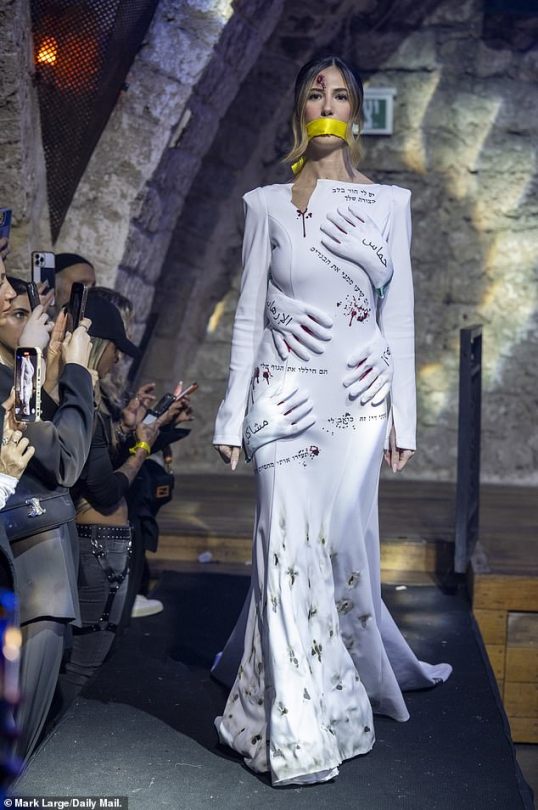
(for all of my updates and ask replies regarding Israel, click here)
#israel#antisemitism#israeli#israel news#israel under attack#israel under fire#israelunderattack#terrorism#anti terrorism#hamas#antisemitic#antisemites#jews#jew#judaism#jumblr#frumblr#jewish
113 notes
·
View notes
Text
Jewish Song of the Day #32: Miriam Haneviah
youtube
Comments:
Shavua tov! I hope you all had a nice, restful Shabbat and that its sweetness lasts you through the whole week.
I love this song, not just because it's Rabbi Deborah Sacks Mintz, but also because it's a feminist counterpart to Eliyahu Hanavi.
This is Rabbi Sacks Mintz's explanation:
In the 1980s, poet and liturgist Rabbi Leila Gal Berner composed a beautiful poetic midrash on one particular narrative moment we read in Exodus: Miriam’s role in leading the women of her community through the sea from the marginalization and oppression of slavery and into the unknown wilderness of freedom. An exploration of her beautiful poetry must begin with a framing of that very Exodus verse:
וַתִּקַּח֩ מִרְיָ֨ם הַנְּבִיאָ֜ה
אֲח֧וֹת אַהֲרֹ֛ן
אֶת־הַתֹּ֖ף בְּיָדָ֑הּ
וַתֵּצֶ֤אןָ כָֽל־הַנָּשִׁים֙ אַחֲרֶ֔יהָ
בְּתֻפִּ֖ים וּבִמְחֹלֹֽת׃
“Then Miriam the prophetess,
Aaron’s sister,
took a timbrel in her hand,
and all the women went out after her
in dance with timbrels”
(Exodus 15:20)
Her curiosity with this verse, combined with a desire to see women prophets and leaders recognized more broadly in ritual moments, drove her to compose the poem we today know as Miriam HaNeviah. Written with a rhythmic cadence designed to match the traditional Eliyahu HaNavi melody, her hope was to raise Miriam up in the moment of havdalah.
The lyrics to the poem itself highlight Miriam’s leadership as multi-faceted: strengthening the the world’s song through her dance, repairing the world through her song, and ultimately, bringing on the waters of redemption only with the partnership of the broader community.
I was deeply inspired by Rabbi Berner, as well as one of my collaborative colleagues Rabbi Ariel Root Wolpe, to continue this process of creative midrash by adding to the story R’ Berner began. She wrote a new text to be sung to a traditional melody, and I wrote a new melody to be sung to that very text. R’ Wolpe herself writes feminist poetry exploring the role of Miriam and, through the context of our hevruta studying women ancestral leaders in prayer and song, unearthed this new melody from inside my own heart and soul.
From a compositional standpoint, the chorus is the main event of this song. Reading “bimheira b’yameinu” - quickly, in our days - there is an urgency to the hope and prayer embedded in this poem for redemption, and thus the melody itself mirrors that urgency, ascending upwards on the word “bimheira.” Other compositional tactics I used regarding such manners of word-painting, include a dance-like groove underscoring each verse, in recognition of the repetition of the phrase “tirkod itanu - dance with us.”
But by far the most essential creative component of this song is that it was recorded exclusively with women. My artistic team for this recording consisted of Rabbi Ariel Root Wolpe, who I mentioned above, as well as Chava Mirel and Elana Arian, two of my long time musical partners who themselves have dedicated their lives in service to the Jewish people through composing, performing, and leading new Jewish music around the world - as both ritual leaders and as women, wives, and mothers. We all felt a deep connection to the women who came before us - including Miriam, as well as the women rabbis and musicians who have influenced our work and lives since - and poured this inspiration into the project. The lush harmonies in this recording are designed to be representative of the voices of generations of women in prayer, song, and leadership.
And here are the lyrics:
מִרְיָם הַנְּבִיאָה עֹז וְזִמְרָה בְּיָדָהּ
בִּמְהֵרָה בְיָמֵינוּ הִיא תְּבִיאֵנ
אֶל מֵי הַיְשׁוּעָה
מִרְיָם תִּרְקֹד אִתָּנוּ לְהַגְדִּיל זִמְרַת עוֹלָם
מִרְיָם תִּרְקֹד אִתָּנוּ לְתַקֵּן אֶת-הָעוֹלָם
בִּמְהֵרָה בְיָמֵינוּ הִיא תְּבִיאֵנוּ
אֶל מֵי הַיְשׁוּעָה
𝑀𝑖𝑟𝑖𝑎𝑚 𝐻𝑎𝑁𝑒𝑣𝑖𝑎ℎ 𝑜𝑧 𝑣’𝑧𝑖𝑚𝑟𝑎 𝑏’𝑦𝑎𝑑𝑎ℎ (x2)
𝐵𝑖𝑚ℎ𝑒𝑖𝑟𝑎 𝑏’𝑦𝑎𝑚𝑒𝑖𝑛𝑢 ℎ𝑖 𝑡𝑒𝑣𝑖𝑒𝑖𝑛𝑢 𝑒𝑙 𝑚𝑒𝑖 ℎ𝑎𝑦𝑒𝑠ℎ𝑢𝑎 (x2)
𝑀𝑖𝑟𝑖𝑎𝑚, 𝑡𝑖𝑟𝑘𝑜𝑑 𝑖𝑡𝑎𝑛𝑢 𝑙’ℎ𝑎𝑔𝑑𝑖𝑙 𝑧𝑖𝑚𝑟𝑎𝑡 𝑜𝑙𝑎𝑚
𝑀𝑖𝑟𝑖𝑎𝑚, 𝑡𝑖𝑟𝑘𝑜𝑑 𝑖𝑡𝑎𝑛𝑢 𝑙’𝑡𝑎𝑘𝑒𝑖𝑛𝑛 𝑒𝑡 ℎ𝑎𝑜𝑙𝑎𝑚
𝐵𝑖𝑚ℎ𝑒𝑖𝑟𝑎 𝑏’𝑦𝑎𝑚𝑒𝑖𝑛𝑢 ℎ𝑖 𝑡𝑒𝑣𝑖𝑒𝑖𝑛𝑢 𝑒𝑙 𝑚𝑒𝑖 ℎ𝑎𝑦𝑒𝑠ℎ𝑢𝑎 (x2)
Miriam, the prophetess
strength and song are in her hands
Soon, and in our time, she will bring us
To the waters of redemption
Miriam will dance with us to strengthen the world’s song
Miriam will dance with us to heal the world
Soon, and in our time, she will bring us
To the waters of redemption
[Source: bandcamp]
43 notes
·
View notes
Note
I liked the folk song you exposed me to. If you feel like it, the first five that hit your mind go! I'll look them up and have a listen ^‿^
Boy I wish I could remember what folk song that was ahahah. I listen to a LOT of folk. A Favored genre. I basically listen to folk and country and then running music. Bless you for not asking for me to pick songs that are my favorites or particularly great, those almost always paralyze me for whatever reason.
HERE'S THE LAST SIX I PLAYED ON YOUTUBE THAT I THINK ARE MORE FOLK THAN COUNTRY
Billy Bragg -- Between The Wars
Iron and Wine--Passing Afternoon
Dave Carter--When I Go (Doc why are there two songs in a row about death? Mind your business, if you're not careful I'll make a whole playlist of the very best of death.)
Bright Eyes-- Land Locked Blues
Trials of Cato-- Gawain
Colter Wall--Sleeping on the Blacktop
And here's three bonus "if you know nothing about folk music here's some important foundational American Contemporary Folk music that you may have never heard" songs (In MOST of these the singers are important but the songs are just, ones I like)
Woody Guthrie-- I ain't got no home in this world-- You know this dude. He wrote "This land is your land". He's the one that has the guitar that says "This machine kills fascists" (Boy whenever people post something referring to that I want to be like, "WHOSE FUCKING GUITAR IS THAT FROM??? TELL ME WHO! TELL ME NOW!"
Pete Seeger -- What Did You Learn in School Today -- you know many many songs by this man. They have been covered by many many people. he wrote "Turn, Turn, Turn" he wrote 'Where Have All the Flowers Gone" he wrote "if I had a hammer" It is BUCKWILD to me that more people don't know who Pete Seeger is. Anyway i picked this song because both he and the below are part of my larger reeducation program that all generations have been politically aware, actually.
Phil Ochs--Draft Dodger Rag-- I fucking love Phil Ochs. He was the first one, by most reasonable evidence, to publish a protest song that named Vietnam by name. He was deeply critical of the US government. He wrote my favorite patriotic song too, though. He was a biting, funny, aggressive Jewish man who started fights even within his own circles (He directly attacks Pete Seeger, I know of at least, in one song. Bob Dylan shoved him out of a limo because Phil was dogging on his songs) and did not know when to fucking quit, and got himself into trouble. I consider his suicide to be one of the great tragedies of the music world, but also not the most surprising thing on God's green and verdant earth. I could give you just a top five Phil Ochs songs. Anyway, I picked this song because everyone picks the aggro ones, but I like also when he's funny. ANYWAY.
33 notes
·
View notes
Note
I'm not jewish, so i have no skin in the game and no right to center myself in i/p, but I'm against hamas, and I know it's insignificant and petty but everytime I see some really good artist or fandom blog or account and then after scrolling a bit I find pro-pally stuff and I just can't follow them anymore. I feel guilty when I like their post and fanarts. after the war in ukraine and the silence to overtalking of russian fandom blogs i gained the bad habit of checking the politics of a fanfiction writer or artist, but most of them wwre either silent anti russia at first before forgetting about it very quickly, but pro pally stuff is everywhere i can't avoid it. sometimes I wonder, maybe if it's just one or two post, or it's not that antisemitic, just misinformation propaganda for pity, maybe I can ignore it, but at the back of my mind I still wonder if they're pro hamas. it would be nice if they at least condemned oct 7, but it's always after that they post about palestine.
would it be acceptable if I just ignored the artist and enjoy the art? can you still enjoy art made by pro-pal or antisemites?
I also start to wonder if i'll still like art and fandom creators from china if it attacks taiwan where i'm from. also how the western left turned their back on ukraine and celebrated hamas terrorism on israel just makes me despair and think, would they blame us if china attacked, call us usa puppets? it once felt so ridiculous but now i can actually see it. i know he was fringe but there was some european politician that said taiwan's election results were us manipulations and the sheer fuck upness of that is just.
sorry for the long post you can ignore it, just wanted to ramble and your blog feels so cool, your humor is how I chill down from hating hamas fans and remember to not become an islamophobe or sinophobe when I know it does me no good and i can't do anything anyway but i'm to scared to post politics in my blog. if you take the time to read this, so that it won't be a complete waste of your time, please also add a donation site for jews you like that uses credit or visa instead of paypal, it probably can't be much but I will donate what I can. thank you so much for reading this
Ur so kind anon ty for sharing ur feelings with me. Personally I do consume media from ppl who think my death would solve all world problems, but thats mostly because I treat artists the same way I treat my mechanic or electrician - they make ha ha funny product or oooh pretty song product, and that is what I consume. I don't care if they say X or Y because I know they have no clue what they're talking about, so getting mad at them feels to me like getting mad at a child for saying or doing something retarded. It's not really "separating the art from the artist" but more akin to "separating the artist from all expectations of niche intelligence" lmao. I also know that if I started boycotting every idiot out there I'd be left with almost nothing to enjoy, so going "ill listen to ur song despite knowing ur an idiot" is very easy for me.
As for donations - idk of anything related to the diaspora, and donations for Israeli organization as far as I know don't have an international audience? Maybe some of my followers can recommend something. Thank you for ur ask and I hope u keep enjoying my nasty little blog, and that West TaiwanTM never attacks you ever ever (but if it will know that I will root for u and never support Xinnie the Pooh may God curse his name) <3
43 notes
·
View notes
Text
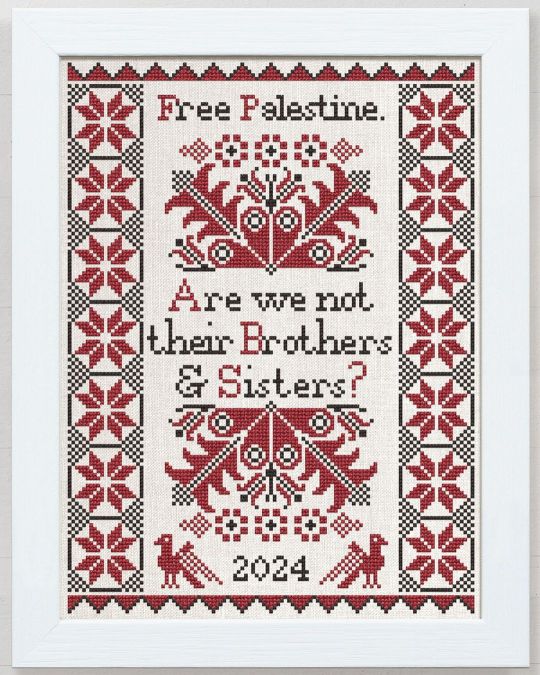

Free Palestine designed by Jacob de Graaf of Modern Folk Embroidery.
Today I want to share a pattern with you that uses Tatreez embroidery elements in support of the people of Palestine struggling through one of the most difficult times in their lives.
I am aware that this is a highly divisive and contentious issue for a lot of people. Some people might be shocked or hurt by me sharing this design. I do hope on the other hand that by speaking out, others will do the same and will not be afraid of any backlash that might be there. Sadly, the world has become more and more polarised – you are either this or that, and if you’re pro-this, you must be anti-that.
The world is a more complex place and though I might be pro-this, it does not mean that I am anti-something-else. I hope you can see that side of me. We should not be scared to stand up for what is right, and to speak about such things without the fear of polarisation getting the better of us. For now, the text below as it appears in the booklet plus download links for the pattern..
Rotterdam, May 8th 2024
Lately, my great-uncle Jacob de Graaf and his wife Trijntje de Kroon have been on my mind. Three years ago, they were posthumously awarded the Yad Vashem award for bravery displayed during the Second World War by hiding Jewish citizens in their homes and saving them from certain death at the hands of the Nazis.
I never got to know them as they passed just before and after my birth, but I admire their bravery in doing what they felt was right at a time when it was not only difficult but potentially life-threatening. They stood up for people they could help.
I thought of it again yesterday when I saw a young man (@samih.madhoun on Instagram) playing a borrowed oud and singing songs in the refugee camp in Rafah, lifting the spirits of fellow refugees through his art. As I tearfully watched the video, I got angry at myself for not doing more besides weeping at my phone.
For months, I have been shocked into a state of numbness by the genocide playing out on my TV, computer and phone. The annihilation of Palestine by the Israeli army is being broadcast to us live, and for too long, I have been struggling with how to express my fear, my anger, my frustration, and my support for the Palestinian people.We cannot turn a blind eye to what is currently happening.
Our political leaders need to take action and speak out against the current genocide. I do not have the bravery of my great-aunt and uncle, but I can design patterns and share them with others—and hopefully inspire folks to speak out, too.
My great-uncle did what was right during WWII. Will we do the same for our brothers and sisters in Palestine?
ABOUT THE DESIGN
This design uses Tatreez motifs found on traditional Palestinian dress. The central motif, called Scissors and Roses (Muqass wa Ward ), comes from Gaza. As the land is torn apart, I split the design into two, placing the question “Are we not their brothers and sisters” between them.
On the sides is a rose border found on a dress from Ramallah. The doves at the bottom are found on many Palestinian embroideries.
TECHNICAL DETAILS
This design uses two colours: Black (2224 crosses) and Red (4226 crosses). It measures 113 crosses in width and 153 crosses in height. It features only full crosses and no specialty stitches. From the second page of the pattern onwards, you will notice a greyed-out area of 3 crosses wide — this indicates an overlap with the previous page to make it easier for you to continue stitching.
The graph below gives size- and floss estimates for a wide range of materials. Floss calculations are based on working with 2 strands on 28- to 36-count linen (14- to 16-count aida). Higher counts use a single strand. You are free to stitch with as many strands as you like. The first floss estimate is for black, the 2nd for red. For instance, on 32-count linen, you would require 1.1 skein of black floss (standard 8 metre length skeins such as DMC and Anchor), and 2.1 skein of red floss.

I charted this in black and red, but feel free to choose your own colours. If you stitch on white, you could add some green to the design for instance to reflect the colours of the Palestinian flag.
Thank you so much for downloading this free pattern and showing your support for Palestine. If you can, please make a donation to organisations who are actually doing amazing work in physically helping the Palestinian people. Two organisations that I have donated to are unwra.org and pcrf.net – but there are many bigger and smaller initiatives worthy of your support.
Click on one of the links below to download your pattern. Feel free to share, print, and redistribute this design. When you do, I would ask not to change the booklet itself.
Free Palestine – A4 format
Free Palestine – Letter format
With love,
Jacob de Graaf
21 notes
·
View notes
Note
Character ask: Queen Esther
Favorite thing about them: Her courage and selflessness when she risks her life to save her people, and her cleverness in the way she uses flattery, entertainment, and well-chosen wording to maneuver the villainous Haman into a vulnerable position and turn her royal husband against him.
Least favorite thing about them: I suppose the fact that at first she's reluctant to approach the king without being summoned and come out as Jewish to him. Of course it's natural that she's afraid to risk her life, but still, thousands of other people's lives are on the line and she almost chooses to protect herself rather than them.
Three things I have in common with them:
*I'm part Jewish.
*I'm often afraid to reveal my Jewish heritage in public.
*I often wear purple – most mass-produced Queen Esther costumes for Purim seem to dress her in purple, since it was associated with royalty in the ancient world.
Three things I don't have in common with them:
*I'm not married to a king.
*I'm not an orphan.
*I've never been to the Middle East.
Favorite line:
Her instructions to Mordecai when she agrees to speak to the king on the Jews' behalf:
"Go, gather together all the Jews who are in Susa, and fast for me. Do not eat or drink for three days, night or day. I and my attendants will fast as you do. When this is done, I will go to the king, even though it is against the law. And if I perish, I perish.”
Her reveal of her Jewish heritage to her husband, with its clever rhetoric of saying that she and her people are threatened, arousing her husband's protective outrage, before she reveals that by this she means Haman's planned genocide of the Jews that her husband had blindly agreed to:
“If I have found favor with you, Your Majesty, and if it pleases you, grant me my life—this is my petition. And spare my people—this is my request. For I and my people have been sold to be destroyed, killed and annihilated."
brOTP: Her cousin and foster father Mordecai.
OTP: Well, I have to say her husband King Ahasuerus, though it's hardly a modern love match, and though there are plenty of valid reasons to loathe him and wish Esther could leave him. If not for their marriage, she couldn't have saved her people.
nOTP: Haman.
Random headcanon: I accept the Talmudic tradition that she was a vegetarian rather than eat non-kosher meat in her husband's palace, but not the tradition that she lived on only legumes and seeds. While I understand the appeal of saying "Out of virtue and piety she turned down the most tempting dishes in favor of plain, simple food," that's not a balanced diet, and Persian cuisine has so many wonderful vegetable dishes she could have chosen from!
Unpopular opinion: I don't think she and Queen Vashti need to be pitted against each other. While I don't like the tradition of vilifying Vashti in order to glorify Esther as the superior, deserving replacement, neither do I think admiring Vashti's courage and defiance means we should look down on Esther for being "docile and submissive" or "complicit with the patriarchy." After all, it's by finally breaking the rules that Esther saves her people, and ironically, despite having banished Vashti for her disobedience and chosen Esther as a suitably docile replacement, Ahasuerus obeys Esther's will in the end. I admire and sympathize with both women and see Vashti as ultimately vindicated by Esther.
Song I associate with them: Well, it's mainly a song about Haman, not Esther, but I have to choose this popular silly children's song for Purim, "A Wicked, Wicked Man." It's the song I most associate with the holiday.
youtube
Favorite picture of them:
These various paintings.

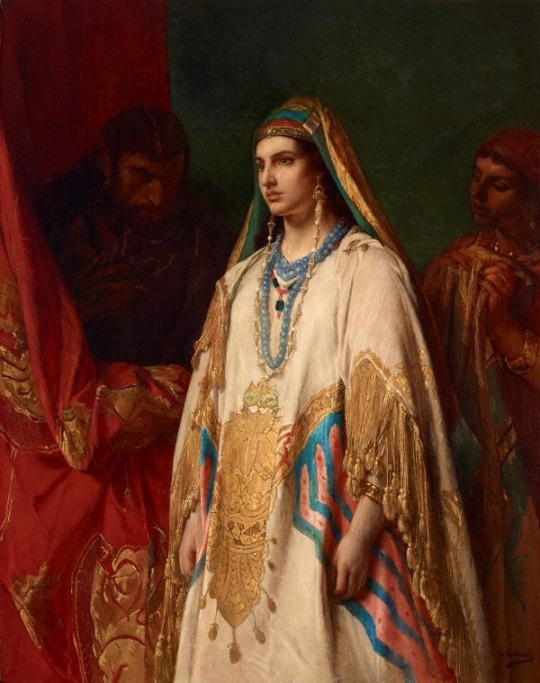

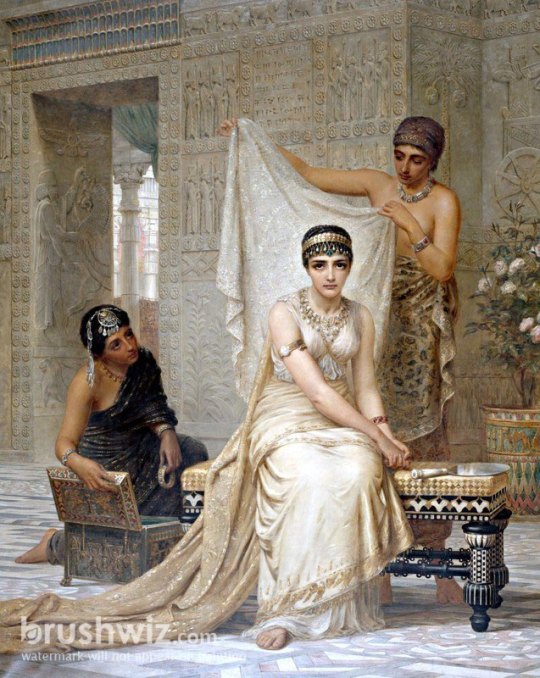
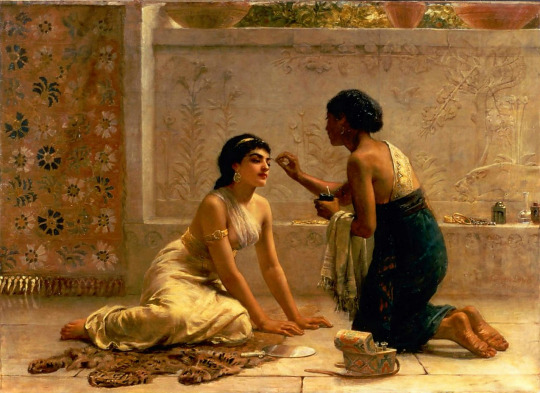
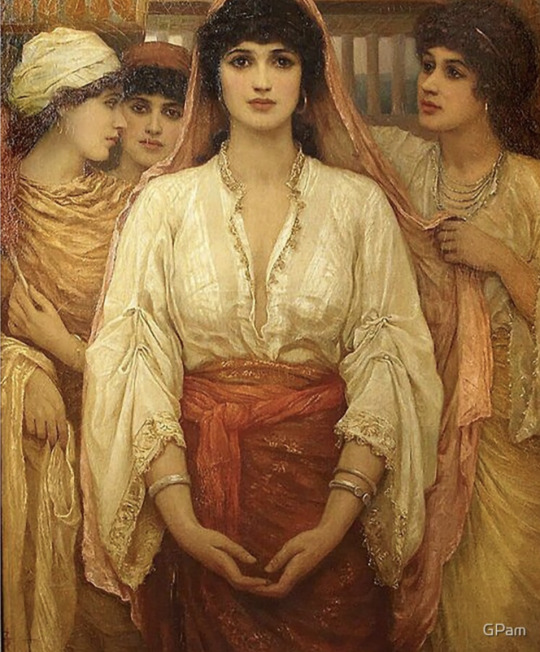
23 notes
·
View notes
Text
by Itzchak Tessler
The people of Israel left Egypt twice, so to speak. According to Jewish tradition, after Jacob and his sons went down to Egypt, their descendants were enslaved by the pharaohs. About 3,300 years ago, after a long period of enslavement, they made their first exodus from Egypt.https://p.ynet.co.il/XRDbA68IN/
In 586 BCE, following the destruction of the First Temple, many Jews, led by the prophet Jeremiah, migrated to Egypt. For over 2,500 years, a vibrant and illustrious Jewish community thrived there.

However, as the State of Israel was taking shape and over the next two decades, the Egyptian government made life increasingly difficult for Jews. This led to a second and final exodus from Egypt, with most Jews immigrating to Israel, and others dispersing primarily to the United States, France, Argentina and Brazil.
With the help of the International Organization of Jews from Egypt, headed by Levana Zamir, and supported by the Zionist Archive of the World Zionist Organization, we have assembled a puzzle that offers a glimpse into the history of this distinguished and ancient community from the beginning of the last century, highlighting the challenges that led to their second and final exodus.
Fleeing Eretz Yisrael to Egypt
In 1915, during the height of World War I, it might be hard to believe, but Jews saw Egypt as a safer refuge than the Land of Israel. That year, Jewish refugees from the Land of Israel arrived in Egypt aboard the American warship Tanas.
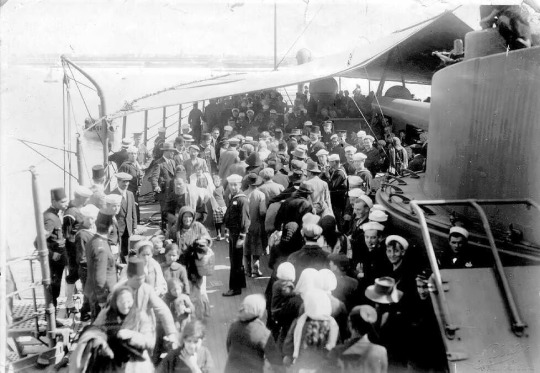
15 View gallery
23 notes
·
View notes
Text
It's really strange to see people on here talking about the police repression across american university campuses and how serious they are in such a spectacular-by-way-of-Bonnano manner - these liberals talking of voting whilst everyone around them with senses to know are rattling the bars, saying, hey, do you trust your water provider? are you safe from the borders? Do you have masks and medication and things to make art with, how much can the state fuck with you? Have you seen the brownshirts? (They were there before, already; this violent wave isn't exceptional, just a steady descent thru oft trodden roads.)
There's footage of a violent arrest on an american campus demo: a student is tazed and restrained. It seems like people filming are everywhere in shot - as journalists have shown where their interests lie, as ai is used to further mechanised slaughter and genocide across the globe, facial recog and data doppelgangers and all the rest - the camera flashes sting. Body cams and documentation have shown their place in societys prison industrial complex. dearrest work and legal observers take nothing away from the cameras if they must be there. Not to backseat analyse, but if i can soapbox about any issue it is about many cameras being cops. This is not to blame any of the brave demonstrators for state violence; it's just something that hurts to see happen again and again; many black and brown and racialised people have spoken about how turning state brutality into media for consumption by white supremacist media is further violence many times already, better than me. German arrests against conferences and other academic organising nodes are subject to legal, border, arrest and other violence; blood literally flies across the world.
I have seen reports of tear gas and rubber bullets (ar Emory) used (update: pepper bullet and spray seems to have been used instead of earlier reported munitions, but the violence at that campus is without question.) I have also seen two sniper's nests at Indiana and Ohio - the sheer brutality being wielded against many campus (here's Boston) demonstrators are not those of earlier in the campus demonstration wave; the escalation people like @ 3liza, @ intactics (and others) are noting as not unlike the ladder used in the escalation of violence that led to the Kent State state murders. american and german (as well as most of anglosphere and 'west europe') states continue to victimise jewish dissenters disproportionately (just as in the KS murders) thanks to the post IHRA-style zionist revisionist legalist shit definitions of anti semitism being used to repress huge numbers of brave people.
Here is an update on palestinian campus and school violence/repression, too.
Update 28th April (28.04):
Join the American Campus Arrest Amnesty Phone Blast here! Calls are needed!
UT Austin Jail Call Support needed!
and to add to the spectacle of it all - hurry to attack capital before a new ideology makes it sacred to you! How does that old song go? - AOC is doing the old cooption enforcing, PR for cops, flashing her maskless face around a swarm of those Damn Cameras. May all journos politicians and bosses fuck off!
Guide to emory encampment.
reportback from emory arrestee
27 notes
·
View notes
Text
Rambling about Hass in Elisabeth for a REALLY long time. TL;DR - yeah, it is necessary as a song...
Because of the costumes and staging people often just see it as "the antisemitism song", which it is, strongly, but I think sometimes the wider context presented therein is ignored. Really, the song shows how antisemitism and hatred are fuelling and entangled with other movements!!
The nationalists in that song come from various groups and social classes, and identify as their enemies:
Socialists
Pacifists
Jewish writers
Jewish women
"Those who are not like us"
Crown prince Rudolf (because of his - historically strong - friendships and other positive associations with Jews)
The Habsburgs as a whole
Elisabeth and her Heinrich Heine (= a Jewish poet) monument project (which also attracted such strong criticism from German nationalists [Austrian Germans who were nationalists, not "Germans" in the modern sense] historically)
Hungary
The "barons" - so the nobility
The "slavic state"
The ongoing "betrayal of the people"
And to contrast, they identify as good:
Strength ("the strong wins, the weak fails", and also "strong leaders") and "purity"
"Unity"
Glory/splendour ("pracht")
Christian values
"Unified Germany", an alliance with Prussia and even an Anschluss (the joining of Austria and other "ethnically German" [so-called] lands to the German Reich. Hmm does anyone remember who also strove for and eventually implemented this... /s)
The conservative Wilhelm II as emperor (again, they want to join Austria into the German Reich)
So like. There is a glorification of all things "German" and of conservative values (religion) and reactionary power politics ("weakness" was and is by similar groups now considered to be a major flaw of liberalism and a liberal world order - in the song, pacifism and socialism are also connected to it), as exemplified by Wilhelm II's Germany specifically. To contrast, racial enemies ("non-Germans") threatening "racial purity" must be eliminated, with violence if necessary. And the Habsburg monarchy, being a multinational empire, is described as immoral and weak because of it being multinational (and the position of Slavs and Hungarians in politics and imperial administration).
The themes of "betraying the people" (Volksverrat) are especially interesting because the enemies of the nationalists as listed in the song, Jewish women, pacifists and socialists, were also the people blamed for German defeat in WW1 (the "stab in the back" at the home front myth). It's overall 19th and 20th century anti-establishment fascist imagery.
Ajdkkf I don't think I'm clearly making my argument but the song's key functions are:
To dispel the myth of the late 19th century being "the good old days", the glory days of Austria before the world wars somehow magically came to happen and ruined it. In fact, the songs shows that the developments leading to the world wars stem from politics and mass movements of hatred that developed alongside and gave power to & drew power from nationalism in the 19th century
To show the audience exactly what Rudolf is talking about in "Die Schatten werden Länger (reprise)". What is the "evil that is developing"? It's not Rudolf's personal petty wish for more power, or his angst about not being emperor yet, or some generic amorphous disdain for how FJ is reigning; it's not the lack of Hungarian independence either, for god's sake. I will die on this hill, if you cut Hass or replace it with conspiracy or whatever you can cut Rudolf as well, Elisabeth as a show is (in my opinion) a good portrayal of him precisely because it depicts him as a political thinker (in contrast to many depictions and post-Mayerling accounts which diminish that and just talk about Mayerling and his "immorality" - a talking point devised by the nationalists and antisemitists who hated him lol, liberal politics were connected to lack of morality) and someone who, unlike most of his contemporaries, saw that antisemitism, emphasis on "power" and realist power politics, exclusionary/hateful rhetoric and excess nationalism would lead to ruin. AND Hass also shows that he was hated by the German nationalists for this! As was his mother, for her sympathy to Heine...
To connect genuine popular dissatisfaction (from Milch - Hass is a reprise of Milch in terms of rhythm and the call-and-response structure where Lucheni talks to the crowd) with inequality, the lack of democracy and the excesses of royalty... to the rise and presentation of fascism as a "solution"
To show that 19th century nationalism was, in many ways, exclusionary, antisemitic, racist and "war-mongering", and that this rhetoric is old - not somehow magically appearing for WW2 and then disappearing again - and will time and again rise... and that it's everyone's responsibility to recognise it for what it is when it happens, if we are to have a reasonable, decent world to live in.
The framing of Hass sometimes confuses people I will never recover from that one post cancelling Elisabeth das musical for being antisemitic because Hass exists ajiddfkdllfgl what's next, it's pro-suicide and homophobic because a character technically dies from being gay? but to me it's rather clear that it's unsympathetic lol, with the whole doomsday atmosphere (no music, just footsteps/marching and drums and screaming, it's meant to be threatening), the way the ensemble harshly criticises the most sympathetically portrayed characters we have seen so far (Elisabeth and Rudolf) for things that seem petty and harmless (having Jewish friends), and the extremely direct comparison drawn to N*zism (to indicate what such a movement would develop to) in many stagings. I don't know how to say this but somehow I've always assumed that "H*tler and n*zism = evil" is EXTREMELY common knowledge and it mystifies me when people like. Think it should have been stated more clearly in the show. Like, the show is working off the assumption that you know what it is and that it's bad because of the millions and millions of people they killed............. this is EXTREMELY common knowledge in Europe, not least in Germany and Austria lol.
So um yeah akwkldlf, sorry for the ramble, I just feel like the song can be poorly understood and criticised on shaky ground sometimes. I mean, I am not Jewish and not equipped to talk about whether it's triggering or traumatising to watch especially with lived or family experience of antisemitic violence... But I think for non-Jewish people there is a huge responsibility to be aware and vigilant of antisemitism, historically and in the present, and sometimes it needs to be hammered home for people to understand...
By that last point I also somewhat mean... I think you don't "get" to be triggered by it if you're not Jewish but perhaps otherwise affected by politics of hatred. Of course I'm not emotions police lol, but many Jewish people have intergenerational trauma AND have to live with extremely similar antisemitic rhetoric and culture to this day, so there I understand criticisms - and there is also a discussion to be had about how and to what extent it is ok to use and display Jewish suffering as a device to educate non-Jewish people.
But anyway, to my original point. This is something I've seen people say and I just... if you're queer and it makes you uncomfortable to see Hass because modern n*zis hate you and it's traumatic, I mean, it's valid to feel uncomfortable and you can choose not to watch it personally to avoid being triggered, but you don't get to call for it to be erased from the show for "problematic content" or for "escapism" or to make you feel better. It is there because the destruction of the 19th century world, and Rudolf's and Elisabeth's suffering, is intrinsically tied to the rise of such hateful politics and without that being shown there is no show. You don't get to make it something it's not, this show is not ONLY an epic gothic romance with imaginary boyfriend, it's a commentary on past, present and future politics in that it shows the dangers of conservatism, antisemitism, racism and illiberalism. Calling for or supporting censorship, or state emphasis on militarism/"destroying the enemy", or advocating hatred, violence or oppression against any group based on ethnicity, religion, race, political views, etc. are all political stances held by and propagated by various people today in various political contexts. And you are not immune to antisemitism or reactionary nationalism if you're queer or whatever, so you have the constant responsibility to think critically about your worldview and your politics!!
23 notes
·
View notes